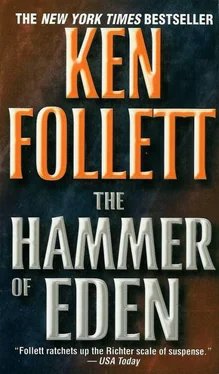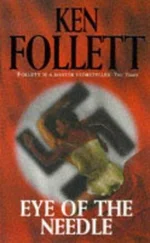Dale moved away, detaching himself from Priest’s embrace. “No,” he said. “Those days are gone.”
Priest was shocked. He was using his full persuasive power, and it was not working. Fury rose inside him, dangerously uncontrollable. He wanted to scream at Dale’s faithlessness and ingratitude. He would have killed them both if he could. But he knew that showing his anger would be a mistake. He had to maintain the facade of calm control.
However, he could not summon up the grit to bid them a gracious farewell. Torn between rage and the need for restraint, he walked silently, with as much dignity as he could muster, out of the cookhouse.
He returned to his cabin.
Two more days and it would have been okay. One day!
He sat on the bed and lit a cigarette. Spirit lay on the floor, watching him mournfully. They were both silent and still, brooding. Melanie would follow him in a minute or two.
But it was Star who came in.
She had not spoken to him since she and Oaktree had driven away from Felicitas last night in the Toyota minivan. He knew she was angered and distressed by the earthquake. He had not yet had time to talk her down.
She said: “I’m going to the police.”
Priest was astonished. Star loathed cops passionately. For her to enter a precinct house would be like Billy Graham going to a gay club. “You’re out of your mind,” he said.
“We killed people yesterday,” she said. “I listened to the radio on the drive back. At least twelve people died, and more than a hundred were hospitalized. Babies and children were hurt. People lost their homes, everything they had — poor people, not just rich. And we did that to them.”
Everything is falling apart — just when I’m about to win!
He reached for her hand. “Do you think I wanted to kill people?”
She backed away, refusing to take his hand. “You sure as hell didn’t look sad when it happened.”
I’ve got to hold it together for just a little longer. I must .
He made himself look penitent. “I was happy the vibrator worked, yes. I was glad we were able to carry out our threat. But I didn’t intend to hurt anyone. I knew there was a risk, and I decided to take it, because what was at stake was so important. I thought you made the same decision.”
“I did, and it was a bad decision, a wicked decision.” Tears came to her eyes. “For Christ’s sake, can’t you see what’s happened to us? We were the kids who believed in love and peace — now we’re killing people! You’re just like Lyndon Johnson. He bombed the Vietnamese and justified it. We said he was full of shit, and he was. I’ve dedicated my whole life to not being like that!”
“So you feel you made a mistake,” Priest said. “I can understand that. What’s hard for me to dig is that you want to redeem yourself by punishing me and the whole commune. You want to betray us to the cops.”
She was taken aback. “I hadn’t looked at it that way,” she said. “I don’t want to punish anyone.”
He had her now. “So what do you really want?” He did not give her time to answer for herself. “I think you need to be sure it’s over.”
“I guess so, yeah.”
He reached out to her, and this time she let him hold her hands. “It’s over,” he said softly.
“I don’t know,” she said.
“There will be no more earthquakes. The governor will give in. You’ll see.”
* * *
Speeding back to San Francisco, Judy was diverted to Sacramento for a meeting at the governor’s office. She grabbed another three or four hours’ sleep in the car, and when she arrived at the Capitol Building she felt ready to bite the world.
Stuart Cleever and Charlie Marsh had flown there from San Francisco. The head of the FBI’s Sacramento office joined them. They met at noon in the conference room of the Horseshoe, the governor’s suite. Al Honeymoon was in the chair.
“There’s a twelve-mile traffic jam on I-80 with people trying to get away from the San Andreas fault,” Honeymoon said. “The other major freeways are almost as bad.”
Cleever said: “The president called the director of the FBI and asked him about public order.” He looked at Judy as if all this was her fault.
“He called Governor Robson, too,” Honeymoon said.
“As of this moment, we do not have a serious public order problem,” Cleever said. “There are reports of looting in three neighborhoods in San Francisco and one in Oakland, but it’s sporadic. The governor has called out the National Guard and stationed them in the armories, although we don’t need them yet. However, if there should be another earthquake …”
The thought made Judy feel ill. “There can’t be another earthquake,” she said.
They all looked at her. Honeymoon made a sardonic face. “You have a suggestion?”
She did. It was a poor one, but they were desperate. “There’s only one thing I can think of,” she said. “Set a trap for him.”
“How?”
“Tell him Governor Robson wants to negotiate with him personally.”
Cleever said: “I don’t believe he’d fall for it.”
“I don’t know.” Judy frowned. “He’s smart, and any smart person would suspect a trap. But he’s a psychopath, and they just love controlling others, calling attention to themselves and their actions, manipulating people and circumstances. The idea of personally negotiating with the governor of California is going to tempt him mightily.”
Honeymoon said: “I guess I’m the only person here who’s met him.”
“That’s right,” Judy said. “I’ve seen him, and spoken to him on the phone, but you spent several minutes in a car with him. What was your impression?”
“You’ve summed him up about right — a smart psychopath. I believe he was angry with me for not being more impressed by him. Like I should have been, I don’t know, more deferential.”
Judy suppressed a grin. Honeymoon did not defer to many people.
Honeymoon went on: “He understood the political difficulties of what he was asking for. I told him the governor could not give in to blackmail. He’d thought of that already, and he had his answer prepared.”
“What was it?”
“He said we could deny what really happened. Announce a freeze on power plant building and say it had nothing to do with the earthquake threat.”
“Is that a possibility?” Judy said.
“Yes. I wouldn’t recommend it, but if the governor put it to me as a plan, I’d have to say it could be made to work. However, the question is academic. I know Mike Robson, and he won’t do it.”
“But he could pretend,” Judy said.
“What do you mean?”
“We could tell Granger the governor is willing to announce the freeze, but only under the right conditions, as he has to protect his political future. He wants to talk personally with Granger to agree to those conditions.”
Stuart Cleever put in: “The Supreme Court has ruled that law enforcement personnel may use trickery, ruse, and deceit. The only thing we’re not permitted to do is threaten to take away the suspect’s children. And if we promise immunity from prosecution, it sticks — we can’t prosecute. But we can certainly do what Judy suggests without violating any laws.”
“Okay,” Honeymoon said. “I don’t know if this is going to work, but I guess we have to try. Let’s do it.”
* * *
Priest and Melanie drove into Sacramento in the dented Cadillac. It was a sunny Saturday afternoon, and the town was thronged with people.
Listening to the car radio soon after midday, Priest had heard the voice of John Truth, although it was not time for his show. “Here is a special message for Peter Shoebury of Eisenhower Junior High,” Truth had said. Shoebury was the man whose identity Priest had borrowed for the FBI press conference, and Eisenhower was the imaginary school attended by Flower. Priest realized the message was for him. “Would Peter Shoebury please call me at the following number,” Truth had said.
Читать дальше












